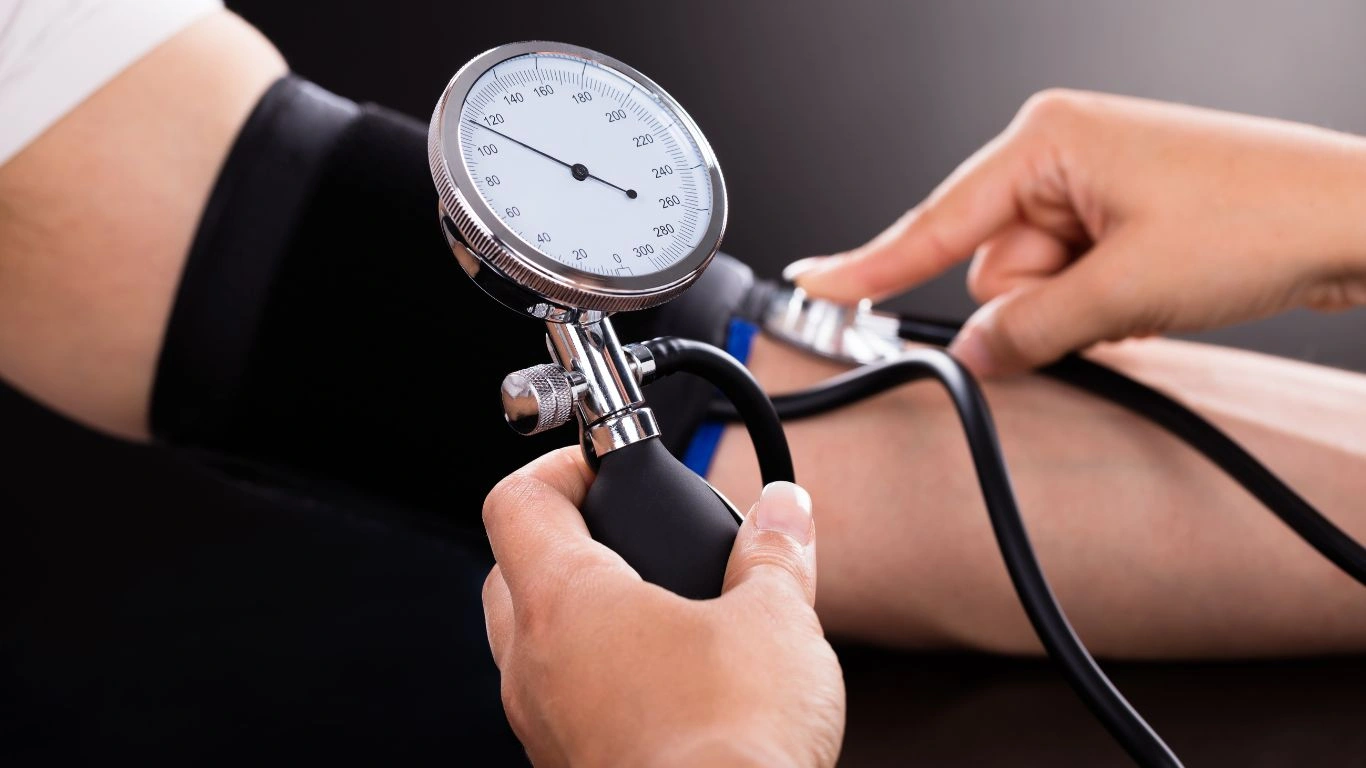The Hidden Dangers of Excessive Protein: A Hypertension Risk You Can’t Ignore
When it comes to hypertension, most people focus on salt, stress, and sedentary lifestyles. But here’s something that often flies under the radar—excessive protein intake. As an Internal Medicine Physician specializing in hypertension management, I’ve seen countless patients puzzled by their stubbornly high blood pressure despite following the usual advice. Turns out, their high-protein diets might be a hidden culprit. If you’re loading up on protein shakes, steaks, and chicken breast thinking it’s all good for your health, we need to talk.
Understanding Hypertension: More Than Just Salt and Genetics

Hypertension, or high blood pressure, isn’t just a numbers game—it’s a silent threat. It can creep up without obvious symptoms and lead to devastating consequences like strokes, heart attacks, and kidney disease. Sure, sodium intake and genetics play a role, but they aren’t the full story. In my years of practice, I’ve seen patients meticulously control their salt intake yet still struggle with high blood pressure. That’s where we start looking at other dietary factors—including protein consumption.
How Excessive Protein Affects Your Blood Pressure

Protein is essential—we need it for muscle repair, immune function, and overall health. But there’s a fine line between getting enough and overloading your system. Here’s what happens when you consume too much:
1. Increased Kidney Load
Your kidneys work hard to filter waste from protein metabolism. When you go overboard with protein, especially from animal sources, it forces your kidneys to work overtime. This can increase sodium retention and disrupt fluid balance, leading to—you guessed it—higher blood pressure.
2. Elevated Nitrogen Waste Products
Protein metabolism produces nitrogen waste, which your body has to eliminate through urine. A high-protein diet can lead to increased blood urea nitrogen (BUN) levels, potentially affecting kidney function over time. And when kidney function declines, blood pressure tends to climb.
3. Impact on Blood Vessel Health
Here’s something many people overlook—diets high in certain animal proteins can promote endothelial dysfunction. This means the blood vessels don’t relax properly, making it harder for blood to flow freely. The result? Increased vascular resistance and—you guessed it again—hypertension.
Animal vs. Plant Protein: Does It Matter?

Not all protein sources are created equal. If you’re eating excessive amounts of red meat, processed meats, and dairy, you may be unknowingly fueling your high blood pressure. These protein sources tend to be high in saturated fats and may contribute to arterial stiffness.
On the flip side, plant-based proteins from foods like beans, lentils, quinoa, and nuts don’t seem to have the same impact on blood pressure. In fact, studies suggest that plant-based protein sources may even help lower hypertension risk. So, if you’re protein-loading with steak and whey protein, it might be time to rethink your approach.
What Does This Mean for Your Diet?
- Balance your protein intake—aim for a mix of animal and plant-based sources.
- Avoid excessive red and processed meat consumption.
- Include more legumes, tofu, nuts, and seeds in your meals.
- Drink enough water to help your kidneys manage protein metabolism efficiently.
Signs You Might Be Eating Too Much Protein

Many of my patients don’t realize they’re overdoing it on protein until they start experiencing subtle but important warning signs. If you’re eating a high-protein diet and dealing with any of the following, it might be time to reassess:
- Increased thirst and frequent urination: Your kidneys work harder to eliminate excess nitrogen from protein breakdown, leading to dehydration.
- Digestive issues: Too much protein—especially from animal sources—can lead to bloating, constipation, or even acid reflux.
- Unexplained fatigue: An imbalance in macronutrients (too much protein and not enough healthy carbs or fats) can leave you feeling sluggish.
- High blood pressure readings: If you’ve been eating a protein-heavy diet and your blood pressure numbers are creeping up, it’s worth looking at your food choices.
One patient of mine, a 45-year-old fitness enthusiast, came to me frustrated. He had swapped out carbs for lean meats, eggs, and whey protein, yet his blood pressure had increased. After tweaking his diet—adding more fiber, reducing excessive animal protein, and hydrating properly—his numbers improved significantly. Small changes, big impact.
Protein Myths That Could Be Hurting Your Health

1. “You Can Never Have Too Much Protein”
This is one of the biggest myths out there. While protein is crucial for muscle repair and metabolic functions, excessive amounts can negatively impact kidney function, blood pressure, and heart health. More is not always better.
2. “Animal Protein is Superior to Plant Protein”
While animal protein sources provide complete amino acid profiles, they also tend to be higher in saturated fats and inflammatory compounds that can contribute to hypertension. Plant-based proteins, on the other hand, often come with fiber, antioxidants, and lower saturated fat levels—making them a heart-healthier choice.
3. “High-Protein Diets Help with Weight Loss, So They Must Be Healthy”
Yes, protein can aid in satiety and weight management, but that doesn’t mean a high-protein diet is automatically good for your cardiovascular system. Many people who follow high-protein diets neglect other key nutrients like fiber and healthy fats, which are essential for maintaining optimal blood pressure.
How to Balance Protein Intake for Optimal Blood Pressure

So, what’s the right amount of protein? The answer depends on your age, activity level, and health status, but a general guideline is:
- Sedentary individuals: Around 0.8 grams of protein per kilogram of body weight.
- Moderately active individuals: About 1.0–1.2 grams per kilogram.
- Athletes or heavy lifters: Up to 1.6–2.0 grams per kilogram.
Here’s how you can ensure a balanced approach to protein without putting unnecessary stress on your heart and kidneys:
- Prioritize plant-based proteins: Include lentils, chickpeas, tofu, tempeh, quinoa, and nuts in your diet.
- Limit processed meats: Avoid deli meats, bacon, and sausages, as they are high in sodium and preservatives.
- Choose lean proteins: If you eat animal protein, opt for fish, skinless poultry, or eggs in moderation.
- Hydrate properly: Drinking enough water helps your kidneys filter excess waste from protein metabolism.
- Incorporate fiber-rich foods: Fruits, vegetables, and whole grains help counterbalance the potential blood pressure-raising effects of excessive protein.
Finding the right balance is key. If you’re unsure about how much protein is right for you, consult a healthcare professional—like me!—to tailor a diet that supports your overall well-being.
Long-Term Health Risks of Excessive Protein Intake

By now, it’s clear that eating too much protein isn’t just a fitness trend gone wrong—it’s a real concern, especially for those dealing with hypertension. But beyond high blood pressure, what other long-term risks should you be aware of? Here’s where things get even more interesting.
1. Kidney Damage and Declining Function
Your kidneys act as natural filters, processing protein waste and balancing fluids in the body. Over time, excess protein—particularly from animal sources—can strain the kidneys, increasing the risk of chronic kidney disease (CKD). Studies suggest that individuals with hypertension who also consume a high-protein diet may experience faster kidney function decline than those with a more balanced approach.
2. Increased Risk of Cardiovascular Disease
Protein-heavy diets, especially those rich in red and processed meats, tend to come with higher saturated fat and cholesterol levels. This can contribute to arterial stiffness, increasing the likelihood of heart disease and stroke. Research has linked excessive protein intake with elevated cardiovascular risk factors, making it crucial to choose your protein sources wisely.
3. Higher Risk of Osteoporosis
Here’s something most people don’t think about—excessive protein intake, particularly from animal sources, can lead to calcium loss through urine. Over time, this can weaken bones, increasing the risk of osteoporosis and fractures. If you’re focused on heart and kidney health, don’t forget your bone health in the process.
Practical Steps to Adjust Your Diet Without Sacrificing Protein

So, if you’re rethinking your protein intake, what’s the best way to adjust your diet without sacrificing nutrition? The good news is, you don’t need to completely overhaul your meals—you just need to find a smarter balance. Here’s how:
1. Swap High-Risk Proteins for Heart-Healthy Alternatives
- Replace red meat with leaner options like fish, skinless poultry, or plant-based proteins.
- Cut down on processed meats (bacon, sausage, deli meats) that are loaded with sodium and preservatives.
- Incorporate more legumes, beans, and lentils, which provide protein while supporting heart health.
2. Balance Your Macronutrients
Instead of going all-in on protein, make sure your plate includes a mix of:
- Healthy carbohydrates: Whole grains, quinoa, brown rice, and sweet potatoes.
- Good fats: Avocados, nuts, seeds, and olive oil.
- Fiber-rich vegetables: Crucial for digestion, heart health, and blood pressure regulation.
3. Stay Hydrated and Monitor Your Sodium Intake
High-protein diets can contribute to dehydration, which in turn affects blood pressure. Make sure to drink plenty of water and keep an eye on hidden sodium in processed protein sources like canned tuna, deli meats, and protein bars.
4. Listen to Your Body and Get Regular Checkups
One of the simplest yet most effective strategies is to track how you feel. If you’re experiencing increased thirst, high blood pressure, or changes in kidney function, it’s time to reassess. Regular blood tests can help monitor kidney health, and routine blood pressure checks will ensure you’re on the right track.
Final Thoughts
Protein is essential, but like anything in life, balance is key. If you’re eating excessive amounts, particularly from high-risk sources, you could be unknowingly increasing your risk of hypertension, kidney damage, and cardiovascular disease. The goal isn’t to eliminate protein—far from it! Instead, it’s about making smart choices that support both muscle health and long-term well-being.
If you’re unsure about your diet or how protein is affecting your blood pressure, talk to a doctor or a registered dietitian. Small tweaks in your diet today can make a world of difference in your health tomorrow.
References
Disclaimer
This article is for informational purposes only and should not be taken as medical advice. If you have concerns about your diet, blood pressure, or overall health, consult a qualified healthcare professional.

Dr. Gwenna Aazee is a board-certified Internal Medicine Physician with a special focus on hypertension management, chronic disease prevention, and patient education. With years of experience in both clinical practice and medical writing, she’s passionate about turning evidence-based medicine into accessible, actionable advice. Through her work at Healthusias.com, Dr. Aazee empowers readers to take charge of their health with confidence and clarity. Off the clock, she enjoys deep dives into nutrition research, long walks with her rescue pup, and simplifying medical jargon one article at a time.







